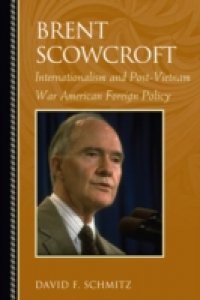As National Security Advisor to President Gerald Ford, advisor to President Ronald Reagan, and as National Security Advisor to President George H. W. Bush, Brent Scowcroft was at the center of the ongoing debate over how to shape American foreign policy in the post-war world. As David F. Schmitz makes clear in his new biography, Scowcroft was a realist in his outlook on American foreign policy and an heir to the Cold War internationalism that had shaped that policy since 1945. During his most important service, as George H. W. Bushs national security advisor, Scowcroft sought to work with like-minded Republicans and Democrats to construct a post-Cold War foreign policy that would provide consistency and stability to American policymaking in a rapidly changing international environment, defend the internationalist position from challenges and criticisms, and buffer the conduct of diplomacy from the turbulence of domestic politics. The type of bi-partisan cooperation and internationalism that marked the pre-Vietnam War years served as Scowcrofts guide to how to defend American interests and promote U.S. values and institutions globally. While not always successful, Scowcroft provided a consistent internationalist voice in the midst of change.

